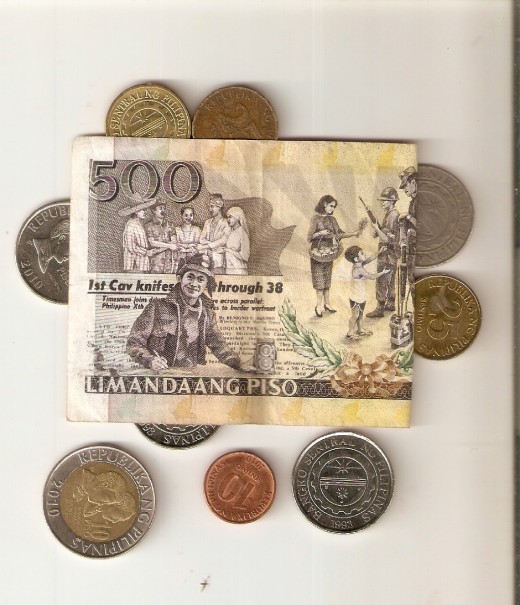Should the Gold Standard in World Currency Return, Its Flaws Must be Corrected
Philippine currency

Flaws in the past gold standard world currency system must be corrected
Is it true that the gold standard will return in January 2013?
An online newsletter posted this news release:
“On January 1, 2013, the world will return to a gold standard.
“This isn't guesswork. Banks in major economies across the globe have already adopted the rules...
“As they prepare for gold to become currency once again, the price of the yellow metal will continue to climb...”(Nick Hodge. Gold standard returns on January Ist. October 13th, 2012. Internet October 14,2012).
Unified gold standard
The gold standard was adopted in the Bretton Woods conference in New Hampshire, USA in 1944. World War II was still raging at that time. Hitler’s Germany was on the verge of defeat on the hands of the Allied powers lead by the USA, Great Britain, and Russia. Bretton Woods set the American dollar as the world currency. An ounce of gold was given the value of US$35.00. It unified the competing world currencies like the British pound and the American dollar. Different countries still held their own currencies but conducted world trade by means of the American dollar.
Simply put, US$35 had a back up deposit of one ounce of gold in the vaults of USA. Likewise, the Philippines had one ounce of gold for every 128 pesos as the exchange rate was 4 pesos to the American dollar. Other countries in the world adopted this system, including the erstwhile members of the Axis powers (Italy, Japan, East and West Germany) upon their defeat in WWII.
In a transaction between countries, if the Philippines bought goods from the USA worth US$1 billion, an equivalent deposit of gold in the vaults of the Philippines was earmarked as belonging to the USA.
France adopted its own peculiar system, although still along the gold standard. If the USA bought from France one Concorde supersonic jet plane worth US$1 billion the equivalent bullion of gold deposit had to be moved physically from the vaults of USA to the vaults of France. That might be cumbersome but that was the way France wanted it and got it.
Flaws of gold standard
There was one flaw in the gold standard demonstrated in 1970s. London was then the center of world trade. That means a lot of world transactions was charged on the gold deposits in London. There was one time world transactions went to the extent that the gold deposits in London was oversubscribed. That is, the charges were worth more than the equivalent gold deposits in London. That constituted a world financial crisis, which meant the gold standard would collapse.
The Minister of the Exchequer in London called for help from other countries like Switzerland and the USA to “lend” gold bullion to the vaults of London. A close call, that saved the gold standard from collapse.
There was another flaw of the gold standard. If a financial crisis occurred in the USA it could spread like wildfire in other countries within the sphere of gold standard. Take the recent depression in the USA that was triggered by the mortgage fiasco. If the gold standard were in effect, that depression in the USA could have triggered depressions in other countries within USA's orbit. However, that depression in the USA has had a greater effect in countries where there have been substantial US investments.
The reason is that the world is using the floating rate system.
USA abandoned gold standard
The USA abandoned the gold standard in 1973 during the term of former president Richard Nixon. The floating rate system took over the gold standard. That means, the American dollar was no longer backed up by a gold deposit. A more elaborated system of the floating rate superseded the gold standard. New money could be created by the Federal Reserve Bank or the International Monetary Fund (IMF) and World Bank by means of entries in the book of accounts. Any country within the IMF orbit is regulated by means of its central bank under the supervision of IMF. Collection of loans and interests is by means of sanctions and force if any country dared renege on a loan. However, a country loan can be written off or forgotten. That is, all that had been spent on a written off loan was the ink and paper space used in the book entry. That cannot be done so frequently, or on a big loan, otherwise the floating rate system will collapse.
A gross inequality among countries had been spurred by the floating rate system where one country lacking in economic and political power has a much lower exchange rate than countries with greater economic and political clout.
One major flaw of the floating rate system is that the Fed has taken over monetary policy; likewise central banks of the capitalist countries have taken over monetary policy of their countries as well. That means the legislative branch (congress) and the president of the country cannot meddle in monetary power, like the printing of new coins and treasury bills, and borrowing from the public. Its implication, in theory and in practice, is that the country has two governments: the executive and the central bank. The president appoints the chairman and members of the board of the central bank but once appointed they are independent from the congress and the president. In short, the economic system is insulated from the political milieu of the country. The Fed can manipulate the interest rate and the president or congress cannot do anything about it. A republic like the Philippines and USA has three branches: executive, lead by the president; legislative (congress); and judicial (the Supreme Court and lower courts).
What if the president of the United States asserts his authority over monetary policy? Ex-president John F. Kennedy issued Executive Order 11110 authorizing the Treasury to mint US silver coins. These coins were in fact minted. After the minting of coins President Kennedy was assassinated in Dallas, Texas in November 1963. Four months after his assassination, the Kennedy coins were melted. President Lyndon B. Johnson who took over Kennedy reversed this executive order (Wikipedia).
One exception: although China has taken loans from the World Bank it does not appear to be totally supine to the IMF and World Bank. In the coming world conference of the IMF-World Bank to be held in Japan middle of this month, the top finance minister of China, Xie Xuren, will not attend (China 'snubs' Japan at IMF and World Bank meeting. Internet Oct. 14,2012). The political system of China is in control of the People's Bank of China. Its governor, Zhou Xiaochuan, will not attend the IMF-World Bank conference in Japan either.
Correct the flaws
The demonstrated flaw of financial conflagration to spread once a major player like the USA met a depression should be corrected.
Another flaw of the gold standard is that the economy of the capitalist world could only expand based on its gold deposits in its vaults. Printing of paper money without the corresponding gold deposit would result in runaway inflation.
Exchange rate disparities
Lesser economies, like the Philippines, await corrections on the gold standard. Lesser economies want less disparities in exchange rates among countries. Disparities are a source of financial and social inequalities among countries with the top 20 industrialized countries having the advantage.








